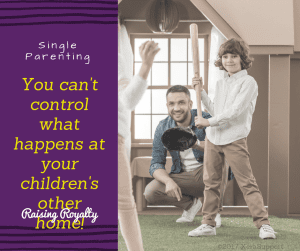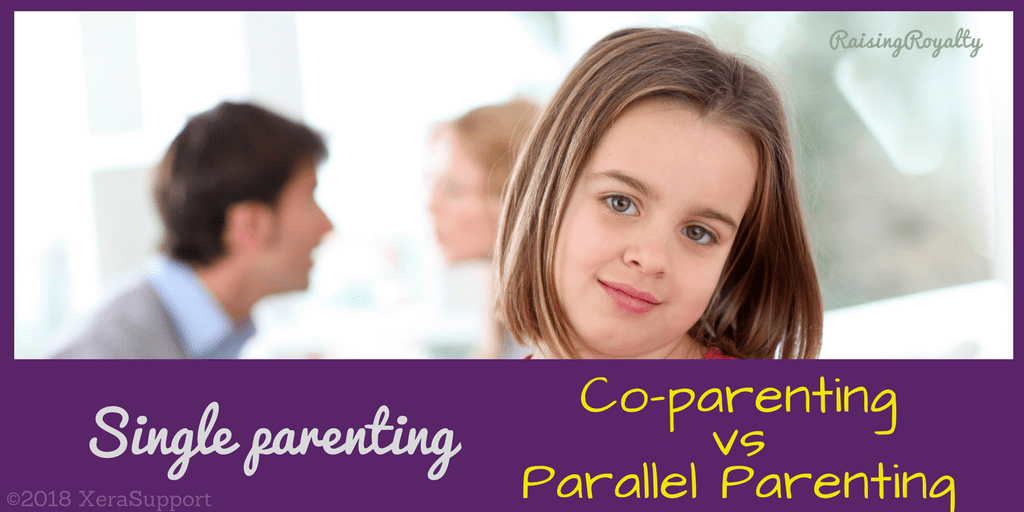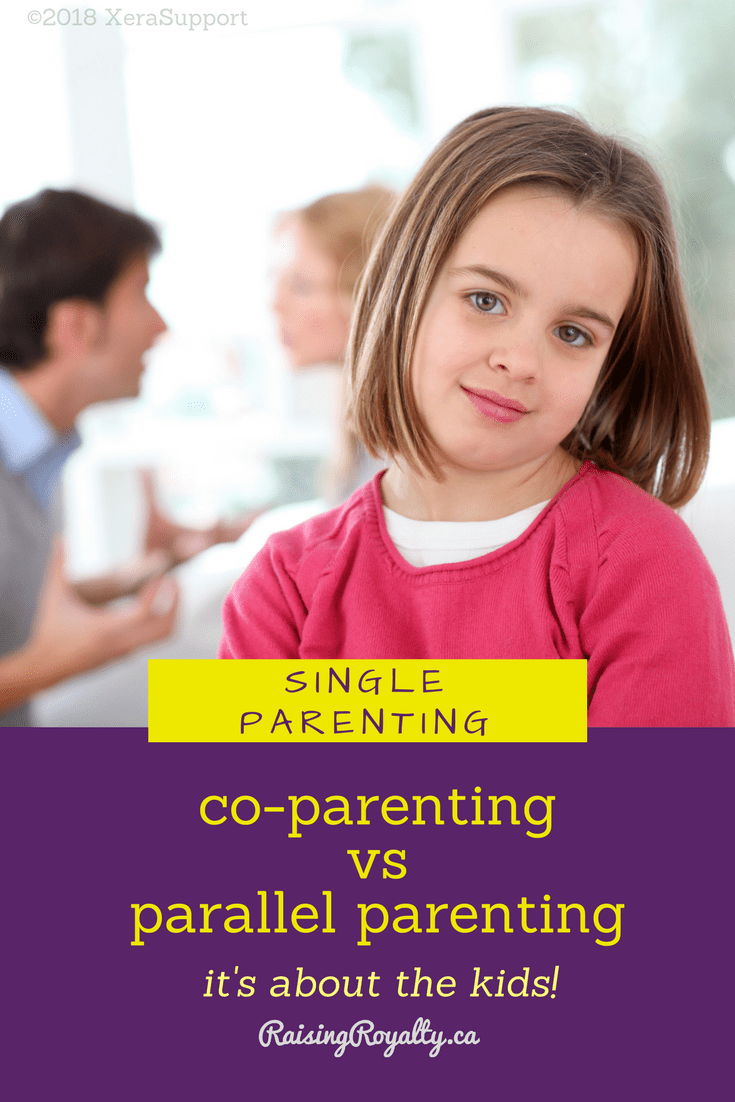Single parents are single for many reasons.
Some are single by choice, adopting or having children through donors. Some are single parents by “accident”, making the choice to have their child after an unplanned pregnancy. But many are single because we had our children while in a relationship, but then our relationships ended.
When you have children with someone you aren’t in a relationship with, it adds a whole new dynamic to your parenting. You don’t have that team-parenting that couples do, all the time, but maybe some of the time? It can be confusing, complicated and frustrating as heck.
There are two ways to parent children when you aren’t in a relationship with the other parent.
You can co-parent your children with them, co-operatively.
Communication may be awkward at times, but generally it’s not hard. And both of you put the kids first, and you can trust that the other parent has your kid’s best interest at heart, even if you don’t always agree what that should look like. And then you may be forced parallel parent your children. Your children’s other parent may be difficult to talk to, may be deliberately aggressive or disagreeable, and may resist your efforts to work with them. And often, the kids’ are used as pawns in an ongoing power struggle between you and the other parent, either deliberately or inadvertently.
Co-parenting with your children’s other parent is, obviously, the better choice. It’s easier to do. It’s better for the kids. And it just makes everyone’s life easier. Co-parenting requires both parents to set aside their feelings towards the other parent, the relationship break-down, and focus on the what’s best for the kids. It requires that you talk to each other.
Communication is key to co-parenting.
Can you talk to your ex-partner about your children, without making negative comments to them? If you have a concern, can you bring it up respectfully? Remembering your manners will go a long way to making co-parenting possible. Even if you have the bulk of the care, as in a typical every-other-weekend visitation schedule, keep your children’s other parent as informed as possible about the kids. Let them know about the kids’ achievements, milestones and activities. Give them as much notice as you get about your daughter’s concert, your son’s tests, the birthday party invitations or playdates.
Co-parenting means that you can still spend time in the company of your ex-partner, without resentment. Yes, it might be awkward and uncomfortable. But you aren’t scared of them, angry at them, or bitter. It’s just a little awkward. You can even get along with, or at least tolerate, your ex-partner’s new partner.
When you can spend time with your ex-partner without drama, your kids benefit. This means that they don’t have to pick who comes to the baseball game. They can go from one house to the other seamlessly, without feeling nervous. And your kids see you working as a team, giving them more security. Secure kids are happy kids!
Co-parenting means that you make at least the big decisions together.
When do you give your son a cell phone? What about summer camp? Should your daughter be able to go to her school dance at 10.. or will you insist that she waits until she’s 12, or 13 or older? While the day-to-day decisions about tv, snacks, or even bedtimes might differ from mom’s house to dad’s house, you’re on the same page with your ex-partner about your rules regarding technology, homework, and dating, among other things.
But what if your ex-partner refuses to co-operate?
What if there are safety concerns, or it’s just too painful to spend any time with your children’s other parent? When you have to be careful about how you talk to them, how much time you spend with them, and getting agreement on anything is next to impossible, co-parenting is also impossible.
That’s when you have to parallel parent.
Parallel parenting means that the rules may be drastically different from mom’s house to dad’s house. You might insist that your kids go to bed at a certain time, that they eat vegetables before sugar, and that they have to help out around the house. Your children’s other parent might have a different approach to bedtime, food, and chores. What can you do? Not much.
 You cannot control how someone else parent’s their kids.
You cannot control how someone else parent’s their kids.
And as much as you (or I) don’t want to admit it, our kids are their kids too! Unless it’s a safety concern (ie, your ex-partner keeps exposing your child to a food that they are severely allergic to), what happens at your children’s other home is really not something you can do much about. Getting upset about it is only going to make your kids struggle. They’ll feel guilty for not following “the rules”, or act out at your home.
What you can do is accept that the rules at mom or dad’s house are different. Allow for a day of transition between visits, and work to re-establish your routines with more reminders and more grace. Don’t allow your kids to guilt you into changing your rules, though. Be calm and firm, and just remind them that mom and dad are different, so what happens over there isn’t what is here. They will appreciate the consistency from you, even if it isn’t always consistent with their other parent.
Parallel parenting means communication is difficult.
And that means your kids may just have to miss out on a few things. This is unfortunate, but keeping them safe is more important. So if attempting to communicate with your ex-partner inevitably results in tension, arguments, fights and hurt feelings (or even more extreme, dangerous situations), then it’s ok if your kids miss out on a birthday party or special event.
You can’t force someone to talk to you.
And you cannot talk to someone who turns every interaction into a competition, or tries to attack, coerce, or control you. So it may be better if you keep the communication to a minimum, when you parallel parent. Continuing to try to communicate with someone who is unwilling or unable to do so safely and respectfully is not only frustrating, but can put you and your kids at risk.
What you can do is minimize the need for communication. Use a written communication book, a special email account, or an app such as Our Family Wizard will help keep the emotion out and keep a record of your communication efforts. That means there’s less reminding, less room for error, and more accountability. Neither of you can claim you weren’t told about something important since it’s written down. And something about text-based communication means that disrespectful or deliberately provocative comments can be deleted entirely.
Parallel parenting means staying apart as much as possible.
Like the communication issue, spending time together may not be safe, kind or the best situation for your kids. Your kids don’t need to see their parents fighting all the time! So if you can’t be in the same room together without someone making a mean comment, then please, for your children’s sake, don’t be in the same room together.
While you might be willing to be respectful in person, if they won’t treat you with the same respect, you do need to protect yourself, and your kids. You cannot keep your kids from their other parent, as much as you might like to, without explicit evidence that the other parent is a danger to the kids. And your kids need their other parent, as much as they need you. But you can keep your ex-partner away from you.
This may mean using public places to facilitate exchanges, or avoiding contact altogether. The other parent picks up and drops off the kids from a neutral, third-party, such as a school, an exchange or supervised visitation centre, or maybe a mutual friend or other family member. This may also mean that if you both attend events for the kids, that you stay away from your ex-partner, as much as possible. Or that you have to miss out on an event.
Whether you co-parent, or parallel parent, it’s all about what’s best for the kids.
You cannot control how your ex-partner will relate to you. If they are willing to communicate, to work with you and to set aside personal feelings and be respectful, you can co-parent with your kids’ other parent. If your ex-partner is difficult, or you cannot set aside your own personal feelings, or there’s some danger involved in interacting withe the other parent, then parallel parenting is best for the kids.
Single parenting isn’t always easy, especially when you have to figure out how to work with another person you aren’t in relationship with anymore. But as long as you keep it about the kids, you can manage a lot more than you realize, sometimes.


